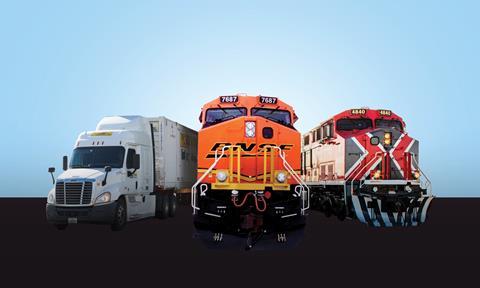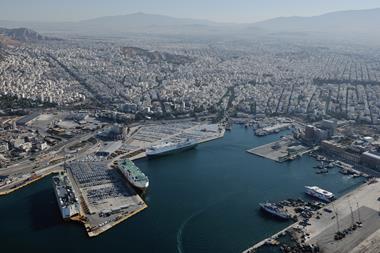Carmakers and parts suppliers shipping freight across the US-Mexico border stand to benefit from a new intermodal service from next year that promises to cut the existing service between Chicago and Monterrey by one day.
The service, which will start on January 1, 2024, is being put together by BNSF Railway, Grupo México Transportes (GMXT) and JB Hunt Transport Services. It will run between Monterrey, Silao-Bajio and Pantaco-Mexico City regions. According to the partnership, BNSF trains and JB Hunt trucks carrying intermodal containers will interchange at Eagle Pass, Texas, to and from GMXT, which will operate the trains between the border crossing and Monterrey, Silao-Bajio and Pantaco-Mexico City six days a week. GMTX owns the majority stake in Ferromex.

The service will also offer an alternative route over the El Paso, Texas border gateway. A spokesperson for BNSF said the new service is specifically for movements of intermodal containers and would include freight of all kinds, including containerised auto parts. BNSF already offers interline services for finished vehicles with Ferromex.
Seamless intermodal
BNSF operates approximately 52,300 km (32,500 miles) of track across 28 US states and three Canadian provinces.
“Our organisations are committed to growth in Mexico and this joint service offering is a direct reflection of that commitment,” said Katie Farmer, BNSF president and CEO. “By utilising the capacity and expertise of the largest intermodal railroad in the US, the largest railroad in Mexico, and the largest domestic intermodal carrier, this product will seamlessly connect the North American intermodal network.”
JB Hunt owns and operates the largest intermodal fleet in North America, with more than 117,000 containers and nearly 7,000 trucks.
“This new service offering will provide resilient, cross-border solutions that give our customers optionality to support their growing supply chain needs in Mexico,” said the logistics provider’s CEO John Roberts. “The cost savings and sustainability benefits of intermodal service are proven, and we’re proud to collaborate with our rail providers BNSF and GMXT to bring this robust service offering to reality.”
“GMXT is ready to support the freight demand growth that nearshoring presents with North America by providing flexible and top-notch rail services to our customers,” said Fernando López, GMXT CEO. “Eagle Pass is a strategic gateway, and we are committed to connecting México and the US through smart and secure borders while helping our countries facilitate the trade.”
Carmakers are updating logistics processes and building more resilience into the supply chain for production volumes in Mexico. Greater efficiency in cross border automotive shipments will support Mexico’s claim of nearshoring opportunities and mitigate rising global logistics costs for carmakers both sides of the border.
Improving intermodal freight connections in Mexico will be under discussion at next week’s Automotive Logistics and Supply Chain Mexico conference, which also includes an interactive workshop addressing key challenges, opportunities and strategies for Mexico’s rail sector.
The conference takes place between December 5-7 in Mexico City and you can still register here
Quantum service
Last month BNSF and JB Hunt announced the launch of a premium intermodal service called Quantum which they said would improve delivery with “consistency, agility and speed” for the transport of road freight using rail.
Representatives from both companies will form the Quantum team, based at a new Intermodal Innovation Center at BNSF headquarters in Fort Worth, Texas. Team members will handle planning, execution, oversight and exception management.
BNSF said users of Quantum could expect a 95% on-time delivery service approximately a day faster than traditional intermodal services.
“Quantum allows customers with service-sensitive freight to benefit from the cost savings of intermodal, while reducing their carbon footprint and maintaining the level of service and consistency needed in their supply chains,” added Darren Field, president of intermodal at JB Hunt.
BNSF said that converting road freight to rail intermodal is the most widely available ground transport solution for cutting carbon emissions, reducing a shipment’s carbon footprint by an average of 60% compared to over-the-road truck transport.

























![Global[1]](https://d3n5uof8vony13.cloudfront.net/Pictures/web/a/d/s/global1_726550.svgz)














No comments yet